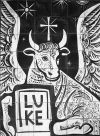
The Gospel of Luke
The call of the first disciples: Lk 5,1-11
Most commentators reckon that the setting in John's Gospel chapter 21 is more original. Following Peter's denials, there is a need in that Gospel for a reconciliation between Peter and Jesus, now the risen Lord. John though gives us a joyful recognition of Jesus (Jn 21,7) rather than a profound awareness of sinfulness as here (5,8).
Whilst the conclusion is the same in Mark and Luke "they left everything and followed him", the two accounts are quite different. In Mark, a remarkable man appears and the four men just abandon all to follow him. Luke's account has instead an encounter between Simon Peter and Jesus. James and John get barely a mention and Andrew appears not at all. (The only mention of Andrew in this Gospel is in the list of disciples (6,14)).
The references I gave suggest that Simon could have had known a good deal about Jesus already. In 4,38, he has even welcomed Jesus to his home. Whilst the equivalent point in Mark's story is closer to Mk 2,13 with Jesus by the lakeside, Luke's setting recalls Mk 4,1-2 where Jesus teaches from a boat.
The experience of the large catch of fish is reflected in Peter's change in adressing Jesus, from Master in verse 4 to Lord in verse 8. By the time the Gospel was written, the early Christians were proclaiming the risen Jesus as Lord. There are echoes here too of Mary's response at the Annunciation (1,38).
As I noted, Peter is the primary subject of this scene. As one commentator noted, this scene is more a commissioning that a calling (which could be said too of Isaiah in Is 6,9-13). Luke is setting up Simon Peter to be leader of the disciples not only in the Gospel (9,20, 22,31, 24,34 for example) but also in the early Church in the Acts of the Apostles
Return now to the main page.
Sunday Gospel: 5th Sunday OT
Isaiah's experience in the Temple is one of the most powerful encounters with God in the Old Testament. It's quite different for example to that of Elijah (1 Kings 19,12). "Holy holy holy" echoes down the ages. The only possible response to the divine glory is the awareness of human sinfulness and then a willingness to volunteer (Is 6,8). Whist the Sunday reading comes to a dramatic ending, reading the rest of the chapter then completes the event by telling the full story of Isaiah's commissioning. That's rather less optimistic than Peter's call in 5,10.
The Sunday reading omits the use of their wings by the seraphs. There is a tendency to omit anything complicated (or embarrassing, as "feet" are an euphemism for "genitals").
The choice of Isaiah therefore focuses on only one part of this story in Luke, Peter's reaction to the huge catch of fish, 5,8. It reminds us of the prologue of John's Gospel: "we beheld his glory" (Jn 1,18).
With that in mind, we can now return to the main page.
